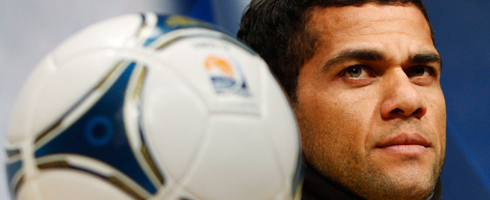Last week’s thrilling Clasico was unfortunately marred by Dani Alves’s complaints that sections of the Bernabeu crowd made monkey gestures towards him during the match.
Yet amazingly, a lot of the reaction from the Press and supporters in Spain was not one of sympathy, but of anger towards the Brazilian.
Alves was accused of using the taunts as a stick with which to beat Real Madrid’s support and exploiting the issue to further entrench the rivalry between Madrid and Barcelona.
It would not be the first time a separate issue was viewed as a squabble between the two biggest clubs in Spain, but racism is too important an issue to be reduced to another element of club rivalry.
Especially when Alves himself stressed that he was not just complaining about his treatment from Real Madrid fans, but from fans all over Spain.
“It doesn't only happen at the Bernabeu, but at all the stadiums we go to,” he emphasised the day after the Clasico.
“This [the Bernabeu] isn't one of the places I feel most like a victim. There are worse; it happens in general all over Spain.”
Yet despite these qualifications, Spanish football fans, the media and other players tried to turn it into another trivial element of the rivalry, while the real important issue – racism – was sidestepped.
The reaction of Real Madrid’s Jose Callejon to the issue was the perfect example of the lack of understanding in Spanish football of the importance of this issue.
Although he stressed: “it's a worrying issue, I don't like seeing it and I hope that one day it will all come to an end”, he also said: “No club has suffered more racist insults throughout its history than Real Madrid.”
Racism in Spain is a complex issue. Few English football fans will forget how Ashley Cole and Shaun Wright-Phillips were the victims of monkey chants when England played Spain a friendly at the Bernabeu in 2004, and just a few months later Spain Coach Luis Aragones referred to Thierry Henry as ‘a black s***’ and was punished with a fine of €3,000 by UEFA.
These incidents were disgraceful but they gave rise to the myths that Spain is a country teeming with bigots. That is not the case at all – Spaniards are generally a friendly bunch willing to have a beer and a laugh with anyone. But it would not be controversial to say that it is still a country that struggles to understand racism.
It is not uncommon to see people with their faces painted black at fancy dress parades in Spain, while the Spanish basketball team posed for a photo before the Beijing Olympics making slit eyed gestures. And of course there were the Spanish Formula 1 fans who mocked Lewis Hamilton by painting their faces black.
Spaniards detest the suggestion that any of the above incidents were racist. They saw the basketball team as just having a laugh, and claimed the Alonso fans were simply using race as a way to get a reaction.
There has been a similar reaction to Alves’ complaints. One journalist wrote an article headlined: ‘Dani, it’s not racism, it’s fear’ while another wrote: “Alves has all the right in the world to denounce this odious behaviour, but where’s the line between racism and insults?”
Spain still has relatively few immigrants in comparison to other Western countries, and, unfortunately, very few ethnic minorities in business and politics. Indeed, football is one of the few industries in which ethnic minorities have had success in Spain.
Spaniards do not come into contact with ethnic minorities very often and are less sensitive to racism than people in countries where minorities are more integrated into society.
This has led to a perception from many people that insulting someone for being black is the same as insulting someone for being fat or ugly. It is not. As Lillian Thuram has put it: “The overweight have never been denied the vote, enslaved or segregated. The historical baggage that comes with the abuse is important.”
Spain still has a long way to go in realising the significance of racism, and the most depressing thing about Alves’ declarations was his pessimism.
“Racism in football is a battle that's lost, until drastic measures are taken. I've been in Spain for 10 years and it's still happening.”
The fact that the incident was brushed off as just being part and parcel of rivalry means it may be another 10 years before the problem goes away.

